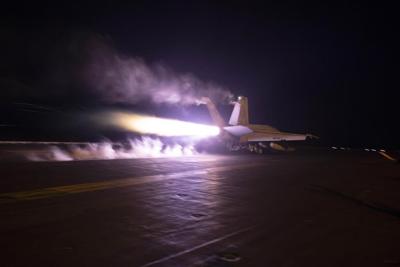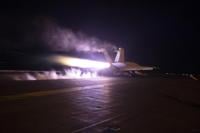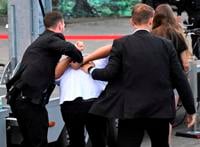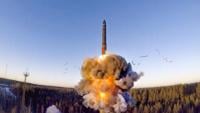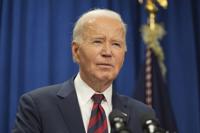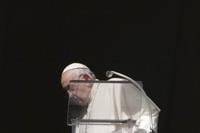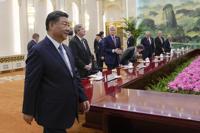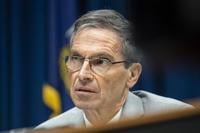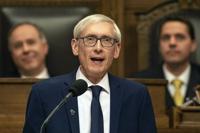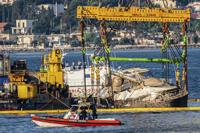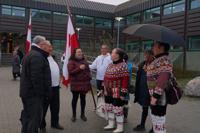UNITED NATIONS (AP) — Russia accused the United States on Monday of aggression against Iraq and Syria aimed at preserving its global dominance and salvaging the Biden administration’s “image” ahead of U.S. elections. The U.S. retorted that its military response to unjustified attacks by Iranian-backed proxies against American forces is not only legal but will continue.
The exchange came at a contentious U.N. Security Council meeting called by Russia, Syria’s closest ally, where both countries also said they did not want an escalation and spillover of the Israel-Hamas war. Many council members expressed fears of a growing Mideast conflict and urged de-escalation and stepped-up peace efforts.
Russia’s U.N. Ambassador Vassily Nebenzia accused the U.S. of violating international law and continuing “to sow chaos and destruction in the Middle East.”
He said violence by the United States and its allies has escalated from the Palestinian territories to Lebanon, the Red Sea and Yemen and is “nullifying international efforts to reestablish peace in the Middle East.” He called on all countries “to unequivocally condemn these senseless acts … which violate the sovereignty of Iraq and the Syrian Arab Republic.”
The Russian ambassador claimed the United States is attempting “to flex muscles ... to justify and salvage the image of the current American administration ... in the light of the upcoming presidential pre-election campaign.” And he claimed the Americans were undertaking military action in an effort “at any price to preserve their dominating position in the world.”
U.S. Deputy Ambassador Robert Wood countered that the United States has an absolute right to self-defense against attacks on American forces and the actions it has taken were “necessary and proportionate.”
He told the council that since Oct. 18, Iran-aligned militia groups have attacked U.S. and coalition forces over hosting U.S. forces fighting Islamic State extremists on Jan. 28 that killed three U.S. Army members and injured many more.
The U.S. responded with on Feb. 2 which both countries claimed resulted in civilian deaths, injuries and property destruction. They condemned the attacks as violations of their sovereignty – as their ambassadors did again at Monday’s council meeting.
Wood stressed that the United States doesn’t want more conflict in a region where it is “actively working to contain and deescalate the conflict in Gaza."
"And we are not seeking a direct conflict with Iran,” Wood said “But we will against unacceptable attacks. Period.”
He accused Iran of failing “to rein in its extremist proxies.”
The United States calls on the 14 other council members, especially those with direct channels to Iran, “to press Iranian leaders to rein in their militias and stop these attacks,” Wood said. “They should also press the Syrian regime to stop giving Iran a platform to destabilize the region.”
Iran’s U.N. Ambassador Amir Saeid Iravani countered that “all of the resistance group in the region are independent,” and said they have legitimate rights to end “the illegal” U.S. presence in Iraq and Syria, stop the killings in Gaza and end Israel’s occupation of Palestinian territories.
“Therefore, any attempt to attribute these actions to Iran or its armed forces is misleading, baseless and unacceptable,” Iravani told the council, adding that Iran has never sought to contribute to a spillover of the conflict, has no military presence in Iraq and has military advisors in Syria at the government’s invitation to fight terrorism.
He rejected claims that Iranian bases in Iraq and Syria were attacked, calling the allegations “unfounded” and attempts “to shift attention away from the U.S. aggressive actions.”
U.N. political chief Rosemary DiCarlo briefed the council, urging all parties to heed Secretary-General Antonio Guterres’ call “to step back from the brink and to consider the unbearable human and economic cost of a potential regional conflict.”
She reiterated his call for an immediate humanitarian ceasefire and action to promote a political roadmap to peace in the region.
China’s U.N. Ambassador Zhang Jun, a Russian ally, echoed her concerns about escalating tensions and actions, and pointed a finger at the United States.
“The US purports that it does not seek to create conflicts in the Middle East or anywhere else, but in reality, it does precisely the opposite,” Zhang said. “The U.S. military actions are undoubtedly stoking new turmoil in this region and further intensifying tensions.”
Algeria’s U.N. Ambassador Amar Bendjama, the Arab representative on the council, defended the sovereignty of Iraq and Syria and also said the U.S. airstrikes “are likely to further exacerbate the already precarious situation.”
“It may potentially lead toward a further escalation,” he warned, urging restraint and de-escalation. ”We firmly believe that force is not and will never be the means for peace and stability,” Bendjama said.

